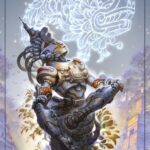
Genres: Fantasy, Historical Fantasy, Queer Protagonists
Representation: Sapphic MC, F/F, secondary polyamory
PoV: 1st person, past tense
Published on: 3rd May 2022
ISBN: 0385548222
Goodreads

Learn about the Mass Dragoning of 1955 in which 300,000 women spontaneously transform into dragons...and change the world.
Alex Green is a young girl in a world much like ours. But this version of 1950's America is characterized by a significant event: The Mass Dragoning of 1955, when hundreds of thousands of ordinary wives and mothers sprouted wings, scales and talons, left a trail of fiery destruction in their path, and took to the skies. Seemingly for good. Was it their choice? What will become of those left behind? Why did Alex's beloved Aunt Marla transform but her mother did not? Alex doesn't know. It's taboo to speak of, even more so than her crush on Sonja, her schoolmate.
Forced into silence, Alex nevertheless must face the consequences of dragons: a mother more protective than ever; a father growing increasingly distant; the upsetting insistence that her aunt never even existed; and a new "sister" obsessed with dragons far beyond propriety. Through loss, rage, and self-discovery, this story follows Alex's journey as she deals with the events leading up to and beyond the Mass Dragoning, and her connection with the phenomenon itself.
I received this book for free from the publisher via NetGalley in exchange for an honest review. This does not affect my opinion of the book or the content of my review.
Highlights
~femme rage (and joy) is draconic
~(but boys and trans people can be dragons too)
~too many grown-ups that should fall off a cliff
~suspicious knotwork
~scientists happy to be wrong
~dragons in space
Books that make you feel things are precious, and When Women Were Dragons made me feel so many things.
A lot of rage. (Not at the book!) A lot of joy. (Definitely at the book.)
In Barnhill’s world, women have a long history – stretching back into ancient times – of transforming into dragons when they are either capital-d Done, or filled with too much joy for a human body to contain. By the time the book starts, though, dragons are creatures of myth and legend, and surrounded by powerful taboos – they’re not to be spoken of, at all, by anyone, ever. And anyway, they’re definitely not real.
The Mass Dragoning of 1955 kind of blows that out of the water.
Or, well – you’d think it would. But the USA (and presumably other countries, although we don’t get much info on how the rest of the world reacts) just comes down harder on any mention of dragons, blacklisting scientists who try to study them, bringing journalists and news stations who try to report on them up on deviancy charges, and dragging activists in front of the Un-American Committee. It’s simultaneously extremely odd and extremely believable – on the one hand, it’s difficult to believe an entire country would work so hard, mostly successfully, to ignore the fact that thousands of people turned into dragons; on the other hand, it’s not hard to imagine why they’d want to. Facing the fact that the gender you subjugate could turn into dragons at any moment and flat-out EAT you??? I can see why that would make a lot of people very uncomfortable. And again and again throughout the book, talk of dragons is obliquely likened to talking about menstruation; it’s seen as a super feminine, somehow shameful, somehow gross thing that cis men are allowed to be horrified by. And thinking about how difficult it is to talk about periods even with a doctor…yep, I get it.
So I’m comfortable accepting this premise and moving on.
The Mass Dragoning doesn’t affect Alex the way it does some children – her mother doesn’t turn into a dragon, and doesn’t set fire to or eat her husband, so she doesn’t lose either of her parents. In fact, she gains a sister – Beatrice, the daughter of her aunt Marla (who did become a dragon) who is subsequently adopted by Alex’s parents. From then on Alex’s life revolves around Beatrice, whom she adores, and Math, the only thing she loves as much as her new sister.
It’s very hard to talk about the plot any more than that without getting into spoiler territory, but wow did this book make me feel things!!! Mostly rage, directed at virtually every grown-up in Alex’s life, because the way she’s treated is despicable. Some of it is good old sexism, like her school telling her to let the boys have the spotlight; some of it is horrific parenting; some of it is just not being there, or being useless, when a young girl desperately needs help.
But I also felt complete and utter delight, particularly in the between-chapters snippets discussing dragons in the past (I will never not be a sucker for fabulous worldbuilding) and the struggles of scientists and others who want to study dragons and the dragoning, and are punished harshly for it. Barnhill manages a very good balance between Alex’s story and the story going on in the world, and her dragons are properly magical and inexplicable, if not very clearly described visually. And any wishes I might have had for more dragons were more than granted by the last third or quarter of the book, when the pages become absolutely packed with them!
(Speaking of the worldbuilding, I’m delighted to be able to assure you that Barnhill has not forgotten that sex, gender and dragons are complicated, and both trans women and cis men are specifically referenced as being able to turn into dragons as well, even though society treats it as a cis women-only thing.)
The ending felt a tiny bit rushed to me, but it wrapped up every thread and subverted a few big expectations, which I generally approve of and approved of here! The ending is also satisfyingly perfect – as in, so packed full of wish-fulfillment it’s almost a happily ever after – after the anguish of Alex’s early life. SHE DESERVES NICE THINGS, OKAY? NICE THINGS AND NICE MATHS. In another book it might have felt cheesy; here, it works.
All in all, this is a deeply feminist work about the power in joy and rage, specifically feminine joy and rage, and how a patriarchy works to suppress that power. Conflating the feminine with dragons is a metaphor that will always work for me, and I think it’ll be a long time before I forget the image of women turning into dragons and flying to space to study the stars.
When Women Were Dragons is definitely one of this year’s knock-outs, and you would be very foolish indeed to miss it!







Leave a Reply